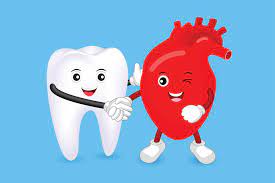
Oral Health: Link to Cardiovascular Disease Explained
In recent years, the relationship between oral health and cardiovascular disease has garnered significant attention from researchers and healthcare professionals alike. This intricate connection suggests that the state of our oral hygiene may have profound implications for our heart’s well-being. Dive deeper as we unravel the surprising ties between oral health and cardiovascular health.

Maintaining good oral health goes beyond just having a beautiful smile; it turns out that oral health is intricately connected to our overall well-being, including the health of our heart. While most people are aware of the connection between oral health and conditions like gum disease and tooth decay, a surprising link has emerged between oral health and cardiovascular disease. Over the years, researchers have uncovered a surprising link between oral health and cardiovascular disease. In this post, we will explore the fascinating connection between the health of our mouths and the health of our hearts, shedding light on the importance of proper dental care for a healthy cardiovascular system.
Understanding Periodontal Disease
Periodontal disease, commonly known as gum disease is a bacterial infection that affects the tissues and bone supporting the teeth. If left untreated, it can lead to tooth loss and impact overall health. But what’s more surprising is the potential link between periodontal disease and cardiovascular disease.
The Role of Oral Bacteria
In addition to inflammation and shared risk factors, oral bacteria may directly contribute to the development of cardiovascular disease. Studies have found that specific bacteria associated with gum disease can enter the bloodstream and attach to fatty plaques in the arteries. This attachment can trigger clot formation, leading to a higher risk of heart attacks and strokes.
Furthermore, oral bacteria can also affect the inner lining of blood vessels, known as the endothelium. When these bacteria enter the bloodstream, they can cause endothelial dysfunction, impairing the blood vessels’ ability to dilate and contract properly. This dysfunction can lead to high blood pressure and reduced blood flow, increasing the risk of cardiovascular events.
The Oral-Systemic Connection
Researchers have found that the bacteria responsible for gum disease can enter the bloodstream through inflamed gum tissues. Once in the bloodstream, these bacteria may trigger an inflammatory response throughout the body, including the blood vessels. This chronic inflammation in the blood vessels can contribute to the development of atherosclerosis, a condition where plaque builds up in the arteries, potentially leading to cardiovascular disease.
To comprehend the link between oral health and cardiovascular disease, it is crucial to understand the role of inflammation. Gum disease, also known as periodontal disease, is caused by bacteria that infect the gums and surrounding tissues. This infection triggers an inflammatory response, leading to swollen and bleeding gums. The same bacteria can enter the bloodstream through the inflamed gum tissues, causing systemic inflammation throughout the body. This chronic inflammation can contribute to the development of cardiovascular disease.
Research has shown that individuals with gum disease have an increased risk of developing various cardiovascular conditions, including heart disease, stroke, and atherosclerosis. Atherosclerosis is a condition characterized by the buildup of plaque inside the arteries, which can eventually lead to blockages and restrict blood flow to the heart. The inflammation caused by gum disease may accelerate this process, making individuals more susceptible to cardiovascular events.

The Role of Oral Hygiene
Given the strong link between oral health and cardiovascular disease, it is crucial to prioritize oral hygiene practices for overall well-being. Regular brushing and flossing, along with routine dental check-ups, are essential for preventing gum disease and maintaining optimal oral health. Additionally, adopting a healthy lifestyle that includes a balanced diet, regular exercise, and avoiding tobacco and excessive alcohol consumption can significantly reduce the risk of both oral health problems and cardiovascular disease. Practicing good oral hygiene is not only essential for a beautiful smile but also for a healthy heart. Regular brushing, flossing, and dental check-ups can help prevent and manage gum disease, potentially reducing the risk of cardiovascular complications.
Impact on of oral health on Heart Health
Studies have shown that individuals with periodontal disease are at a higher risk of developing heart disease compared to those with healthy gums. The inflammation caused by gum disease may contribute to the progression of atherosclerosis, increasing the risk of heart attacks and strokes.
Shared Risk Factors
While inflammation plays a significant role in the oral health-cardiovascular disease connection, there are also shared risk factors that contribute to both conditions. Poor oral hygiene practices, such as infrequent brushing and flossing, can lead to gum disease. Similarly, these habits are often associated with an unhealthy lifestyle, including a high-sugar diet, smoking, and excessive alcohol consumption. These lifestyle factors not only increase the risk of gum disease but also contribute to the development of cardiovascular disease.
Moreover, certain medical conditions, such as diabetes and obesity, are known risk factors for both gum disease and cardiovascular disease. Diabetes affects the body’s ability to regulate blood sugar levels, making individuals more prone to infections, including gum disease. Similarly, obesity is associated with chronic inflammation and an increased risk of developing cardiovascular problems. By addressing these shared risk factors, individuals can improve both their oral health and cardiovascular health simultaneously.
Some risk factors for gum disease and cardiovascular disease overlap, such as smoking, poor diet, and lack of physical activity. These shared risk factors may further emphasize the connection between oral health and heart health.

Addressing the Link
Healthcare professionals are increasingly recognizing the importance of addressing oral health as part of overall health management. Dentists and physicians are collaborating to provide comprehensive care, taking into account the potential impact of oral health on cardiovascular health. To promote overall well-being, adopting a holistic approach to health is crucial. This includes not only regular dental visits but also making lifestyle choices that support both oral and cardiovascular health, such as a balanced diet, regular exercise, and avoiding tobacco use.
The surprising link between oral health and cardiovascular disease underscores the significance of taking care of our mouths to safeguard our hearts. The connection is rooted in inflammation, shared risk factors, and the direct impact of oral bacteria on the cardiovascular system. Maintaining good oral hygiene and addressing gum disease can contribute to better cardiovascular health, reducing the risk of heart disease and related complications. As we continue to unravel the complexities of the oral-systemic connection, let us embrace a proactive approach to our overall health by giving due attention to both our dental and cardiovascular well-being. By prioritizing oral health and addressing shared risk factors, individuals can reduce their risk of developing gum disease and cardiovascular problems simultaneously. Taking care of your teeth and gums is not only crucial for a beautiful smile but also for a healthy heart. Remember, a healthy smile may be the window to a healthy heart!
Disclaimer: The information provided in this content is for general informational purposes only. It is not intended as medical or healthcare advice, diagnosis, or treatment. Always seek the advice of a qualified healthcare professional with any questions you may have regarding a medical condition or healthcare decisions.
















